

Ryan Carson of Treehouse, on When Titles Get in the Way. Photo This interview with Ryan Carson, chief executive of Treehouse, an online interactive education platform, was conducted and condensed by Adam Bryant.
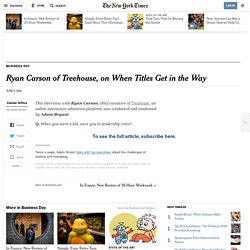
Q. 15 Economic Facts About Millennials. The 20.5th Century Workforce — Millennials Today. Why You Hate Work. Photo THE way we’re working isn’t working.
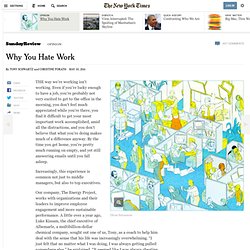
Even if you’re lucky enough to have a job, you’re probably not very excited to get to the office in the morning, you don’t feel much appreciated while you’re there, you find it difficult to get your most important work accomplished, amid all the distractions, and you don’t believe that what you’re doing makes much of a difference anyway. By the time you get home, you’re pretty much running on empty, and yet still answering emails until you fall asleep.
Increasingly, this experience is common not just to middle managers, but also to top executives. Our company, The Energy Project, works with organizations and their leaders to improve employee engagement and more sustainable performance. Continue reading the main story Regular time for creative or strategic thinking Ability to focus on one thing at a time Opportunities to do what is most enjoyed Level of meaning and significance Connection to your company’s mission A sense of community Mr. Mr. Can the Crowd Run a Company? The growing power, secrecy and opaque decision-making processes of corporations are often cited as a major threat to free, democratic societies.
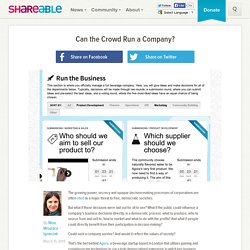
A business within the business — The Connected Company. A lot of problems in business could be solved if we could align the interests of employees and managers with owners.
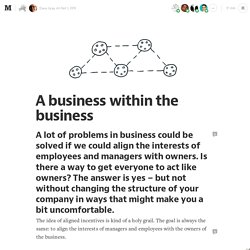
Is there a way to get everyone to act like owners? The answer is yes – but not without changing the structure of your company in ways that might make you a bit uncomfortable. The idea of aligned incentives is kind of a holy grail. Definition of Organizational Culture. I had the great pleasure of doing a webinar recently with Brad Palmer, the CEO of Jostle.
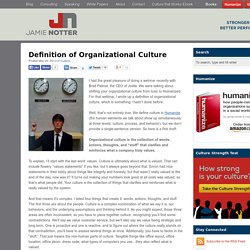
We were talking about shifting your organizational culture from toxic to Humanized. For that webinar, I wrote up a definition of organizational culture, which is something I hadn’t done before. Well, that’s not entirely true. We define culture in Humanize (the human elements we talk about show up simultaneously at three levels: culture, process, and behavior), but we don’t provide a single-sentence version.
Www.assh.org. What We Do « Menlo Innovations. 5 Ways Millennials Will Shape the Future of Work. Guest post by Dan Schawbel Millennials, also known as Generation Y, will comprise 75 percent of the global workforce by 2025.
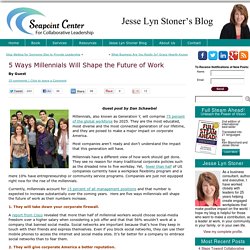
They are the most educated, most diverse and the most connected generation of our lifetime, and they are poised to make a major impact on corporate America. Most companies aren’t ready and don’t understand the impact that this generation will have. Millennials Want Companies That Work On Innovative Ways To Fix The World. In spite of all the economic, societal, and environmental obstacles thrown their way, millennials the world over still believe that things can change--and that business in particular can move the world into a better place. Deloitte's 2013 Global Millennial Survey asked millennials who were born after January 1982 about how business can innovate and impact society. These are some of the highlights of their answers. Millennials and the Reshaping of Charity and Online Giving. October 13, 2014; NPR George Norlin, president of the University of Colorado, once said, “He who knows only his own generation remains always a child.”
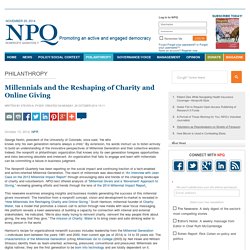
By extension, his words instruct us to listen actively to build an understanding of the innovative perspectives of Millennial Generation and their collective wisdom. Indeed, the nonprofit or philanthropic organization that knows only its own generation foregoes opportunities and risks becoming obsolete and irrelevant. An organization that fails to engage and learn with millennials can be committing a failure in business judgment. The Nonprofit Quarterly has been reporting on the social impact and continuing traction of a tech-enabled and action-oriented Millennial Generation. This newswire examines emerging insights and business models generating the success of this millennial givers movement. FREE DOWNLOAD: Must-Read Fundraising Insights for Nonprofits The 2014 Millennial Impact Report refers to the Bureau of Labor Statistics. Strategic principles for competing in the digital age. The board of a large European insurer was pressing management for answers.
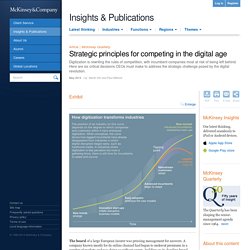
A company known mostly for its online channel had begun to undercut premiums in a number of markets and was doing so without agents, building on its dazzling brand reputation online and using new technologies to engage buyers. Some of the insurer’s senior managers were sure the threat would abate. Others pointed to serious downtrends in policy renewals among younger customers avidly using new web-based price-comparison tools. The board decided that the company needed to quicken its digital pace.
For many leaders, this story may sound familiar, harkening back to the scary days, 15 years ago, when they encountered the first wave of Internet competitors. The digital technologies underlying these competitive thrusts may not be new, but they are being used to new effect. Opportunities and threats.